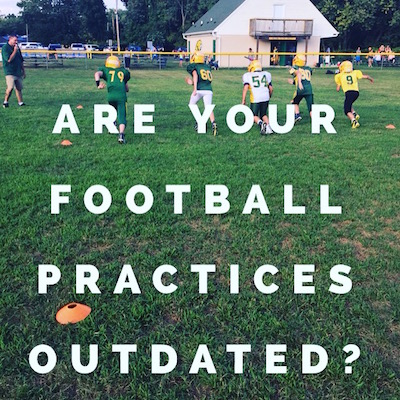How to Motivate Youth Football Players

One of the toughest things to do in Youth Football is to get players motivated to work hard to prepare themselves at practice for the game.
This has a variety of different roots but at its core the problem is that players have not made the connection between hard work and improving. This delayed satisfaction as a reward for hard work is also what makes football, and most other sports, such great learning tools for student athletes. That makes our role as Youth Coaches important to help develop this delayed satisfaction model and begin to introduce it to students.
Hard Football Practices Do Not Fit
It’s critical that as coaches we use a gradual approach to get kids used to putting in work and seeing the rewards far down the line. Many times coaches will start the season with their hardest practices since that is the model they were used to growing up. This goes back to the days when High School and Colleges Coaches had to use two-a-days to get their players in shape since they weren’t allowed to condition in the offseason. These hard practices are outdated and don’t fit the current sports model. See Football Practice Plans.
Today many athletes spend their whole year playing different sports so they aren’t in need of tough practices to condition. Even with the players who are out of shape these tough practices don’t have the desired effect of getting the players tougher and in better shape. More often the players end up despising football and practices which causes them to put forward just enough effort so they don’t get yelled at.
These practices can create a very negative situation. First the players have not experienced any success so this can serve to run off players who are not sure if they want to play football. Even if they are forced by their parents to finish the season they will always view practice as something negative and dread going.
If this player is going to continue to play he will need to have enough positive experiences throughout the season to override the negative ones that started the season. In addition to this many young children remember the negative experiences much more than the positive ones, this is especially true when it comes to first encounters.
Hard Work Pays Off
This means that the best way to start practices is by slowly introducing the ideas of hard work as a tool to develop skills. This can be done best in a specific skill set that can be picked up fairly quickly. In these situations players can learn a skill and get better at the skill through with a few quick drills. This helps to plant the seed in player’s brains that if they listen to the coach and follow their instructions they will improve. This is one of the most rewarding experiences for players and creates a cause and effect model that can last the rest of their life.
As youth coaches we must work to develop the love of the game in the next generation of kids. This is not done through yelling and screaming but instead through teaching players that, through hard work, they can improve their skills and become better football players. This creates a feedback loop that leaves players with an internal desire to work hard so they can improve their skills and become better football players. These are the lessons that will spill over into the rest of their life and make them successful employees, husbands and fathers.











